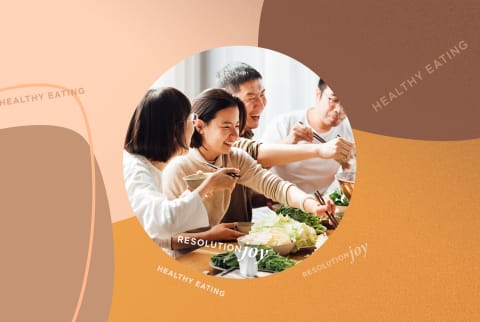So many people are preoccupied with calories, grams of protein, or whether to become vegan. As a nutritional psychiatrist, I remain diet agnostic, especially for patients who seek to improve their mental well-being. In my experience, a healthy eating style is less about sticking to a specific diet and more about simply doing your best to make better food choices. So whether my patients are carnivores or vegans, I remain open to helping them eat better for their mental health. It’s important to remember that nutrition is a marathon and not a sprint—any positive habit you adopt is helping you on your way to better overall mental and physical health. Everyone can elevate their food game, and we all have to start somewhere. Now, back to that “food is life” sentiment: One of the best steps you can take toward healthier eating is finding more joy in food and cooking. It’s not challenging to improve your experience with food—it merely requires paying better attention to your body and mind. Here are a few things that help personally ground me in the joy of food and nutrition, which may benefit you, too: My food shopping and prep day is Sunday afternoons; it’s generally a two- or three-hour time commitment. To make cooking less of a chore, I also like to be prepared with a few options to make during the week, which helps lower the stress, too. I keep my weekday cooking super simple. As long as there are healthy whole foods on my plate, I’m good to go. If I want to tackle a more complex recipe, I save that for the weekend, when there’s more time to experiment. During the pandemic, I decided to start saying grace again before eating—a habit I was raised with but that had slipped away. I actually found food more joyful when I embraced prayer. If this has meaning to you, try it out. Simple gratitude connects you back to the experience of your meal. I find that making time for my meals also encourages more mindful eating. So rather than mindlessly chewing and inhaling food, I savor the flavor and texture and enjoy dinner conversations with my family. Also, instead of watching TV or looking at my phone, I eat without gadgets. I’ve found food is even tastier and my digestion is calmer when I stick to this practice. I’ve also noticed I feel satiated with less food than when I’m eating mindlessly and not paying attention to my body cues. The warmth prepares me for bed, and the experience of slowly sipping helps my mind slow down, too. I take this to reflect on my day, releasing any negatives and focusing on the joyful positives. A cutting-edge nutrition deep dive taught by 20+ top health & wellness experts



